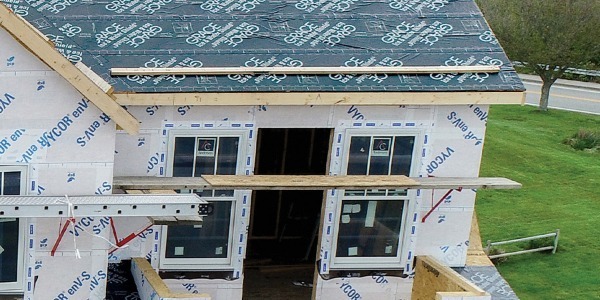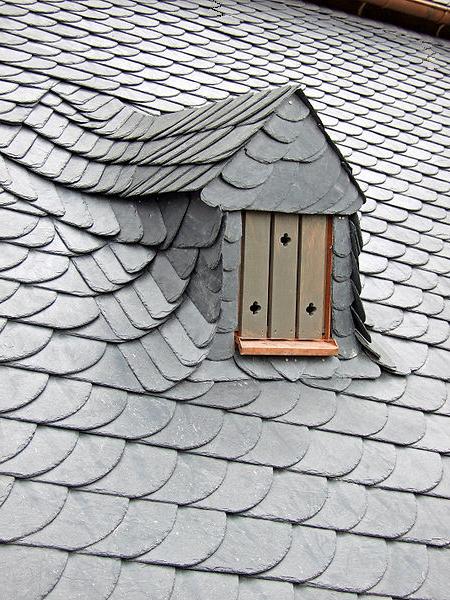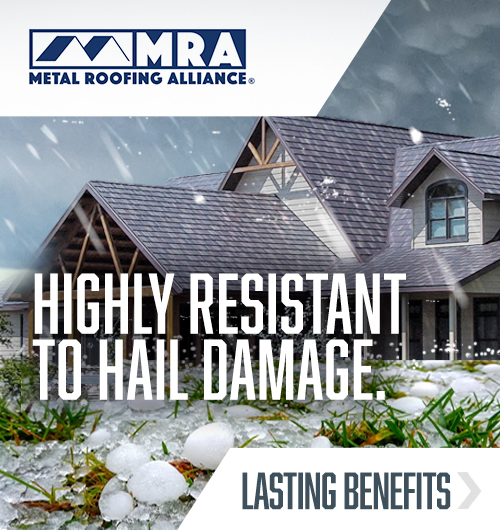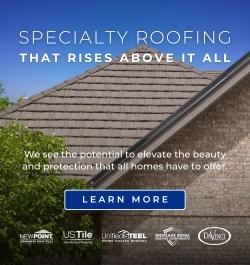Debunking the Myths of Slate Roofing

By Slate Roofing Contractors Association.
The Slate Roofing Contractors Association (SRCA) is here to demystify the common misconceptions about slate roofing in this comprehensive article.
Homeowners have been enjoying natural and organic slate shingles in North America for over 400 years. However, with longevity often comes some common misconceptions. Here at the SRCA we want to address and breakdown some of the myths that have been created over the years about slate roofs.
Myth no. 1: Slate lasts forever
While exceptional durability is a characteristic of slate shingles, with some slates having an expected service life of over 200 years, the fact is slate is like all other natural and human-made materials in that they must, according to the laws of thermodynamics, transition from a state of order to disorder, from high entropy to low entropy. The service life of slate shingles depends largely on the geology of the slate – its mineral composition and the heat and pressure it was subjected to during its formation – a process known as metamorphism.
Myth no. 2: No maintenance required
Implicit in the myth that slate lasts forever is that a slate roof does not have to be maintained. Again, not true. Like all roofs, slate roofs do require some maintenance. The level of maintenance needed typically varies depending on whether the roof is in the early, middle or late stage. One of the beauties of a slate roof, however, is that repair is a relatively straight forward process, wherein a damaged slate can be easily removed using a tool called a “ripper” and a new, matching, slate shingle inserted in its place.
Myth no. 3: Slate fines found in gutters is an indication of poor-quality slate
Slate fines – tiny pieces of slate ranging in size from that of a pin head to a small button – typically appear in gutter troughs within the first several months of a slate roof’s installation. Slate fines result from trimming, cutting, and nail punching operations that occur during fabrication at the quarry and during installation on the roof. Fines remaining on the roof after completion will gradually be washed downslope and into the gutters with each passing rainfall.
Myth no. 4: A few broken slates one year after installation is an indication of poor workmanship
As discussed in Myth No. 1, it is not unusual for broken slates to occur a year or two after installation. Cracks can occur in the slate shingles as slaters trim, punch, install and walk on the slate during the construction process. Many of the cracked slates are identified as the slaters break down their means of access and are replaced with new, matching slates. Some cracks, however, are too fine to be identified, or are located in the concealed portion of the slate shingles. It is these few slates that can break and slide out of position early in the roof’s service life.
Myth no. 5: Attic stock will break-down quickly because it is not exposed to the weather
While it is true a) that blocks of slate are more difficult to split into shingles when they lose their quarry sap (inherent moisture within the stone) and quarries make every effort to prevent this from happening, and b) hot-cold cycling can result in the transformation of certain impurities contained within some slates into gypsum, thereby resulting in an expansion in volume and delamination over long periods of time, it is not true that slates stored indoors become more brittle and/or less durable.
Myth no. 6: There are no slate roofing contractors anymore
A shortage of construction workers has confronted the building trades in general since at least the turn of the twenty-first century as older workers retire and fewer young people enter the field, preferring less physically demanding work opportunities. While there are fewer slaters in the field today than 25-years ago, the trade is not dead. One only needs to look as far as the National Slate Association’s website for a list of slate roofing contractors by state.
Myth no. 7: Slate roofs are too heavy
Slate roofs are heavy. The weight of a slate roof, of course, depends on the thickness of the slate. Quarter-inch thick slate weights approximately 935 pounds per square (per 100 square feet of roof area), or 9.35 pounds per square foot (psf), when laid with a standard 3” headlap. Half-inch thick slate weighs approximately 18.70 psf. At these weights, the loads can be too great for standard post World War II construction. At the very least, if a structure never had a slate roof, a licensed structural engineer should evaluate the roof framing and associated load paths to determine if a slate roof is feasible, or whether supplemental framing or other modifications are needed.
Myth no. 8: Natural roofing slate is no longer available
Although there has been a consolidation in the number of commercial slate quarries and a number of quarries and slate types are in transition at the time of this writing (Fall 2022), S1 North American natural slate shingles are very much available in a wide variety of colors and all standard sizes. Slate from the Buckingham district of Virginia, the Vermont/New York district, and the Glendyne quarry of Canada, representing the full range of historical colors – black, green, gray, purple, red, mottled purple and green, strata gray – are in full production and readily available in the marketplace.
Further info on these myths can be found here.
Original article source: SRCA
Have a question? AskARoofer.
Find your local roofing contractor in the RoofersCoffeeShop® Contractor Directory.










Comments
Leave a Reply
Have an account? Login to leave a comment!
Sign In